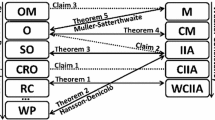Abstract
Explores, for several classes of social choice rules, the distribution of the number of profiles at which a rule can be strategically manipulated. In this paper, we will do comparative social choice, looking for information about how social choice rules compare in their vulnerability to strategic misrepresentation of preferences.
Similar content being viewed by others
References
Black D (1958) Theory of committees and elections. Cambridge University Press, Cambridge
Blair D (1981) On the ubiquity of strategic voting opportunities. Int Econ Rev 22: 649–655
Chamberlin JR (1985) An investigation into the relative manipulability of four voting systems. Behav Sci 30: 195–203
Feldman A (1980) Welfare economics and social choice theory. Martinus Nijhoff, Boston
Gibbard A (1973) Manipulation of voting schemes: a general result. Econometrica 41: 587–602
Kelly JS (1988) Conjectures and unsolved problems: 4. Minimal manipulability and local strategy-proofness. Soc Choice Welfare 5: 81–85
Kelly JS (1989) Conjectures and unsolved problems: 8. Interjacency. Soc Choice Welfare 6: 331–335
Kelly JS (1990) Impossibility results with resoluteness. Econ Lett 34: 15–19
Kemeny J (1959) Mathematics without numbers. Daedalus 88: 577–591
Lacroix SF (1800) Eloge historique de Jean-Charles Borda. Paris
Lepelley D, Mbih B (1987) The proportion of coalitionally unstable situations under the plurality rule. Econ Lett 24: 311–315
Luce RD, Raiffa H (1957) Games and decision: introduction and critical survey. Wiley, New York
Mascart J (1919) La vie et les travaux du Chevalier Jean-Charles de Borda (1733–1799): épisodes de la vie scientifique au XVIIIe siècle. Lyon
Muller E, Satterthwaite MA (1977) The equivalence of strong positive association and strategy-proofness. J Econ Theory 14: 412–418
Nitzan SI (1985) The vulnerability of point-voting schemes to preference variation and strategic manipulation. Publ Choice 47: 349–370
Nurmi H (1987) Comparing voting systems. Reidel, Dordrecht
Pattanaik PK (1978) Strategy and group chocie. North-Holland, Amsterdam
Riker WH (1982) Liberalism against populism. W.H. Freeman, San Francisco
Saari DG (1987) Susceptibility to manipulation. Publ Choice 64: 21–41
Satterthwaite MA (1975) Strategy-proofness and Arrow's conditions: existence and correspondence theorems for voting procedures and social welfare functions. J Econ Theory 10: 187–217
Author information
Authors and Affiliations
Additional information
I am indebted to Universidad Internacional Menendez Pelayo for an invitation to present an early version of this paper at a June, 1989 conference at Valencia, Spain. Thanks for comments go to the participants of that conference, especially Salvador Barbera; also for comments at seminars at Syracuse University and the University of Rochester.
Rights and permissions
About this article
Cite this article
Kelly, J.S. Almost all social choice rules are highly manipulable, but a few aren't. Soc Choice Welfare 10, 161–175 (1993). https://doi.org/10.1007/BF00183344
Received:
Accepted:
Issue Date:
DOI: https://doi.org/10.1007/BF00183344




